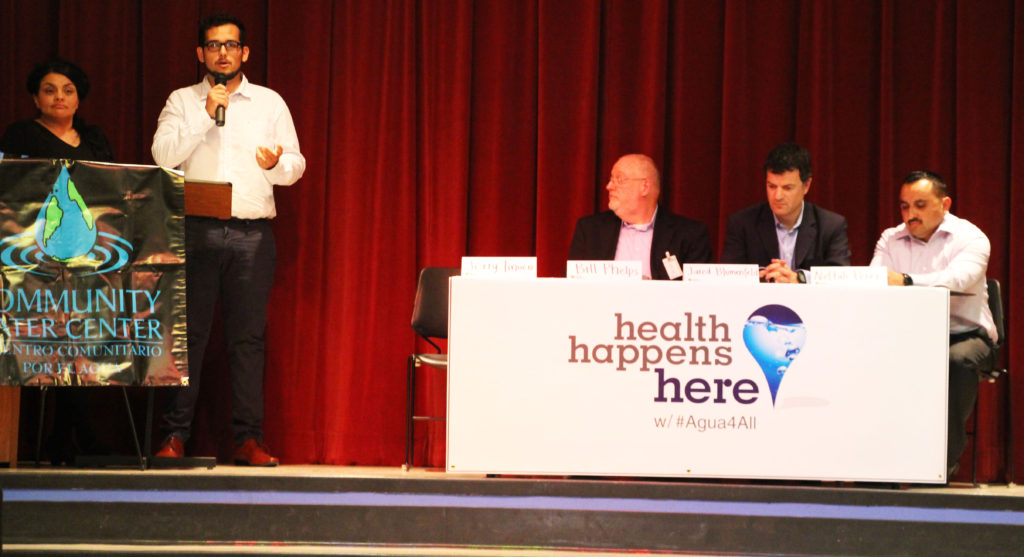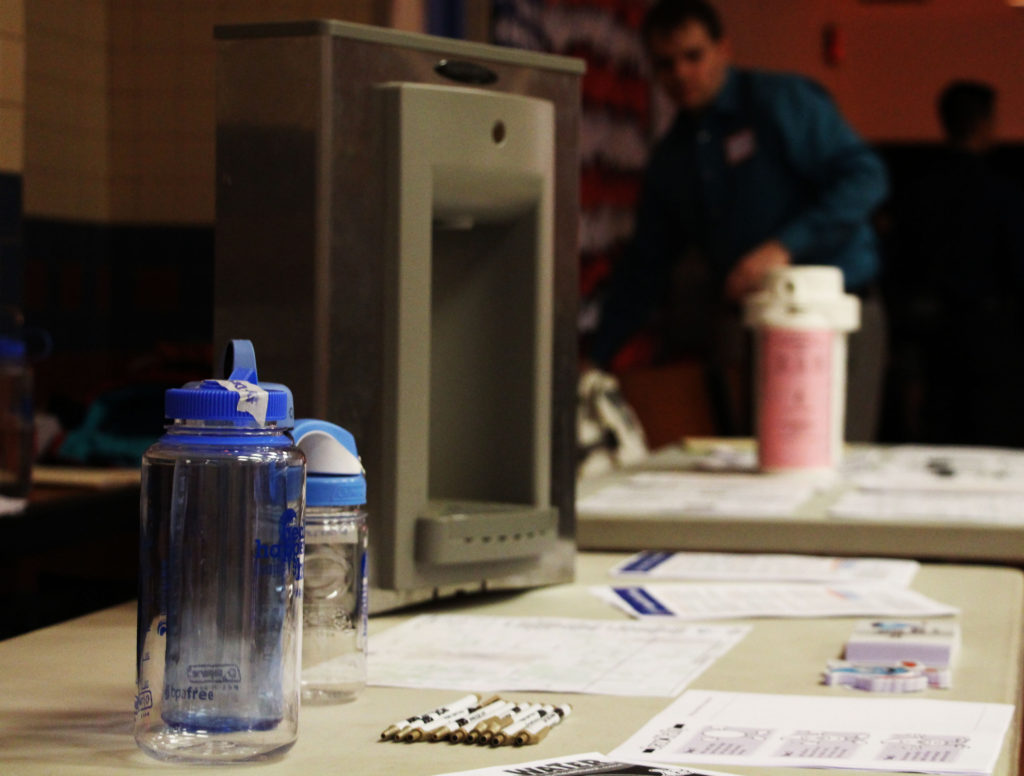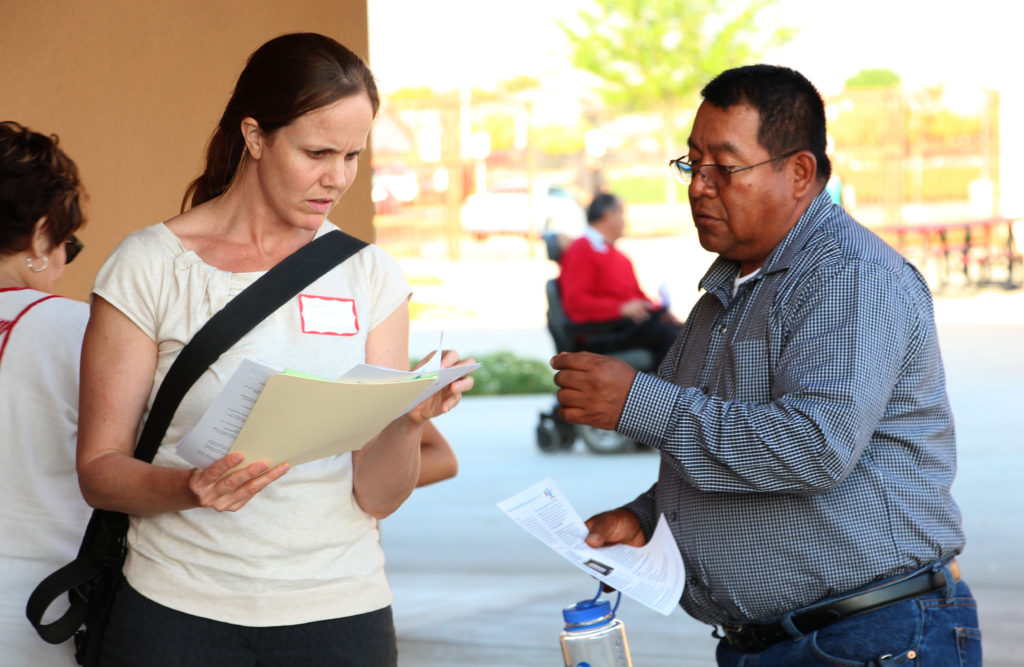The Dolores Huerta Foundation is looking for youth who would like to participate in painting a mural in Rexland Acres Park located at 325 E. Fairview Road in Bakersfield.
Call Nancy Becerra at (661) 322-3033 for more information.
The community is invited to a public meeting to learn and provide input for an affordable housing project being proposed on Main Street in Lamont by the Housing Authority of Kern County and American Community Development.
The meeting will be held June 8 at 5:30 p.m. at the David Head Center, 10300 San Diego St. in Lamont.
For more information call Joseph Leon at (661) 331-2982.
South Kern Sol, Commentary, Randy Villegas
Equality does not mean equity. It’s a distinction administrators with the Kern High School District (KHSD) need to understand.
In 2011, California Gov. Jerry Brown signed into law the Local Control Funding Formula, revamping how the state funds K-12 public schools with an eye toward providing more money to schools that serve larger numbers of high need students, including low-income students, English learners and foster youth.
LCFF is about equity.
Sadly, KHSD has chosen instead to distribute most of its state dollars aimed at higher need students equally across all of the schools in the district. It has done so without regard to differences in student population and the need for more resources to serve higher need students.
And if the data is to be believed those differences are dramatic.
According to the Kern Education Justice Collaborative, a consortium of community organizations working to improve education for underserved students and their families in Kern County, there are a number of schools in the district where overwhelming majorities of students are high need. These include Mira Monte High and South High (90.6 percent), Arvin High (87.6 percent), and East High (83.5 percent).
Then there are other schools where the need for support exists, just not in as great numbers. Some 32 percent of students at Stockdale High are considered high need, while 24 percent of students at Centennial fall under this category. (Both schools have been recognized for their high academic achievement by U.S. News Best High School rankings, which tracks school performance nationally.)
Despite the disproportionately larger number of high-need students in the first group, KHSD has chosen to allocate funding equally among all its campuses. This means that Stockdale High School will be allocated the same amount of money as Arvin High School. Centennial will receive the same amount as Mira Monte High School.
This is an injustice.
Equality is about giving everyone the same thing … this would make sense if everyone started from the same place. But that simply isn’t the case.
There is plenty of research showing the disproportionate and growing educational challenges that low-income students, English learners and foster youth face even before they enter school. Once they do begin school, the disparities in resources and rigor only set them even farther back from they more affluent peers.
While a student from Stockdale High School may have the latest iPhone with an unlimited data plan and the latest MacBook pro to do a research paper, for example, a student from East High typically only has Internet access at the school’s aging computer lab. And while Foothill High School offers only 2 AP courses, Stockdale High School, on the other side of the freeway offers 21. This doesn’t take into account the many clubs and booster programs at wealthier schools that fundraise for enrichment activities like field trips, additional instruction, coaches, supplies and equipment for sports teams, clubs, etc.
Unfortunately, it seems KHSD administrators don’t understand the inequitable distribution of resources within the district. Maybe it’s because their students don’t attend these schools, and so they are not affected by the decision.
Whatever the reason, by not holding true to the intent of LCFF decision makers for KHSD are perpetuating the message that a student’s academic success depends upon how much money their family makes. They are limiting the opportunity of thousands of high need students to succeed and thrive in this ever competitive climate.
A student from North, East, and Arvin should have the same opportunities as a student from Centennial, Stockdale, and Liberty. KHSD needs to ensure that students are encouraged and able to participate in AP classes and curriculum. It needs to allocate funding that targets helping students with the highest need, and it needs to focus on increasing opportunities to students whose educational resources are already very limited.
In order to enjoy true equality we need to establish equity in our funding first.
The Dolores Huerta Foundation, Faith in Action Kern County and the Kern Education Justice Collaborative have teamed up to host a Local Control Accountability Plan (LCAP) Forum to inform the community about why community involvement in school spending decisions is critical right now that schools are receiving public input on the LCAP.
The new school funding formula, enacted in 2013 gives more control to school districts. School districts must develop LCAP’s, a plan that connects the districts goals and actions to its plan for spending the LCFF dollars.
The LCFF recognizes that students who have less may need more to achieve equity and includes additional funding for low income students, English language learners and foster kids.
The forum will be held Monday, May 16 from 6 to 8 p.m. at the Reider Education Center, 2000 K Street, Room 101 in Bakersfield. Dinner will be provided.
South Kern Sol, Staff
Please join us on Sunday, April 24 to learn how you or someone you know may be able to reduce a low level felony conviction to a misdemeanor under Proposition 47. Doing so, will increase your opportunities for housing, employment, education and more. Proposition 47 ends in 2017.
In Kern County more than 8,500 individuals have taken advantage of the largest felony reclassification effort in U.S. history and successfully reduced their felonies to misdemeanors, according to Tanya Richard with the Kern County Public Defenders office. She estimates that about 20,000 more people living in Kern County could potentially benefit from Proposition 47.
The forum will be held at Compassion Christian Center, 1030 4th Street in Bakersfield from 2 p.m. to 4 p.m. The American Civil Liberties Union of Southern California (ACLU) will also be there to discuss your rights regarding law enforcement.
Editors Note: Question and Answer with Deputy Public Defender Tanya Richard from the Kern County Public Defenders Office.
Why should individuals act now?
There is a sunset provision for reducing past convictions to misdemeanors. On November 5, 2017, past convictions will not be subject to reduction under Proposition 47. Past convictions may be reduced under a different penal code section, but the reduction will not occur as a matter of law.
What types of Charges are subject to reduction
Types of offenses subject to reduction include simple possession for personal use of a controlled substance(s) and some theft charges if the value is under $950 and the property is taken from a business during business hours.
Is there a fee to apply?
There is no fee to apply for a Proposition 47 reduction. The courts do not charge filing fees.
How long is the process?
The court requires 25 court days for service. It takes approximately a month for the documents to be processed by the court, once they are submitted. An appearance at court is not mandatory. The Court may grant your request via minute order before the court date. If eligibility is contested, the individual may have to appear at a court date.
Is there anything else you would like to add?
Proposition 47 does not restore gun rights. Even after the charge is reduced to a misdemeanor, an individual cannot possess guns, ammunition or other weapons.
The Proposition 47 forms are on the Kern County Superior Court website. If a person applies on their own, Form 500 and Form 502 must be served on the Kern County Superior Court and the District Attorney. The Public Defenders Office can assist or the individual can apply on their own.
Please join us for Building Healthy Communities South Kern’s 6th annual Live the Challenge 5K Color Run or Walk next Saturday, April 23 at DiGiorgio Park located at the corner of Meyer and Haven Drive in Arvin at 7:00 a.m.
The event is free and everyone who registers will receive a free t-shirt the day of the event. Pre-registration will close at 7:45 a.m. the day of the event. The run will begin at 8:00 a.m. For more information, please call 661-845-2724.
Save time the day of the event by registering here today.
South Kern Sol, News Report, Marcus Castro
South Kern community members gathered at the #Agua4All rally to celebrate the installation of filters in certain locations throughout the South Kern that produce safe water, but also to discuss how that is just a start to fixing a larger problem.
The installation of 71 water stations and 88 point-of-use filters in the South Kern was the reason for celebration at the rally, which was held on April 5 at El Camino Real Elementary School in Arvin.
“It’s [filtration system installation] a big accomplishment, and we’re definitely here to celebrate because this is the largest project of its kind in all of the state,” said South Kern Community Programs Coordinator for the Community Water Center Jerry Tinoco as he spoke from the panel. The #Agua4all initiative is a project of The California Endowment and other groups including the Rural Community Assistance Corporation, the Community Water Center and Building Healthy Communities South Kern, which aims to increase access to safe drinking water.

The panel of speakers at the rally consisted of Jerry Tinoco, Chief of Program Services for Clinica Sierra Vista Bill Phelps, Administrator of EPA’s Pacific Southwest Region Jared Blumenfeld, and Local Parent and Director of Maintenance, Operations, Transportation, Safety for Arvin Union School District Neftali Perez.
The new filtration systems is designed to use adsorption to remove contaminants from the water. The filters will be able to filter up to 960 gallons before having to be replaced, but there is currently work being done to create new filters that can filter more than 960 gallons before being replaced.
Blumenfeld explained that the filtration systems are cheap, therefore, they can be added in most places. He used the examples of the filters being added in locations such as schools, hospitals and homes.
The rally was a time for celebration, but it was also a time for realization as the speakers explained that the problem is not solved.
Tinoco said, “We’re not out of the woods quite yet. This is just an interim solution to a much larger problem.”
Tinoco explained that only a portion of the problem is fixed. He said now kids can go to school and have safe water to drink out of the water fountains, but he mentioned that when these kids go home, they drink water that is unsafe.

According to California State Water Resources Control Board’s Annual Compliance Report, more than 1 million Californians do not have access to safe drinking water in their homes, schools or neighborhoods.
Water contamination is known to be associated with cancer, impaired development, diabetes and more.
“An exposure to unsafe water increased children and adults to risks that include learning disabilities and certain types of cancer,” said Phelps.
Phelps went on to say that it is critical for the community to have safe water as the human body needs water to function at a regular level.
Tinoco said that the community is small, and it is hard to get recognition from the state to move forward.
“Look at our community. It’s a small, farm working, low-income community. It’s pretty easy for lawmakers in Sacramento to forget about us,” said Tinoco.
Phelps mentioned that another problem is water isn’t affordable enough. He said that buying water in the communities where water is unsafe to drink shouldn’t be allowed to become a financial burden of families.
The main contaminant in the water is arsenic. Arsenic is a contaminant that naturally appears in rock and soil, but it also comes from fertilizers, pesticides, mining and more.

The Maximum Contaminant Level for arsenic is 10 parts per billion. There are places in the South Kern that have nearly three times that amount in the water.
Arsenic is more likely to negatively affect children, infants and pregnant women.
People are exposed to arsenic not only through drinking it but through cooking with it as well.
Perez explained that in order to rid the water of arsenic and other contaminants, the community must work together.
Perez said, “I believe we can be successful as a community if we stay strong and united… I am committed to the goal, and I am committed to #Agua4All.”
Community Water Center, Rural Community Assistance Corporation and The California Endowment invite the community to celebrate the installation of over 70 water stations and point-of use filters in South Kern, which were installed as a temporary response to address the lack of clean drinking water in the area.
“The program will highlight the progress Arvin and Lamont have made to improve access to safe drinking water in our schools and neighborhoods and also remind our leaders that much more work remains to be done,” read a statement put out by Community Water Center today.
The community celebration and press conference will be held Tuesday, April 5 at 5 p.m. at El Camino Real Elementary School, 811 El Camino Real in Arvin.
To RSVP click here. Call Gerardo Tinoco at gerardo.tinoco@
The event is part of The California Endowment’s #Agua4All campaign.

The Kern Education Justice Collaborative, the Dolores Huerta Foundation and CSUB’s Center for Social Justice invite school administrators and the community for a free screening of StrikeOut, a docudrama about the harsh policies and discipline practices in Kern schools, which push students out of the classrooms and into the juvenile justice system.
A panel discussion following the film will include: Dr. Ramona Bishop Superintendent of Vallejo Unified School District, an exemplar in the movement to dismantle the School-to-Prison pipeline; Dr. Rob Arias, Chief Deputy of State and Local Initiatives for the Kern County Superintendent of Schools; Erika Brooks, Education Director with the Dolores Huerta Foundation; Joey Williams, Faith in Action’s Lead Organizer; and Miguel Orozco, writer and producer of StrikeOut.
Tickets are limited. Register for your free tickets here.
For more information contact Gerald Cantu at (661) 322-3033.